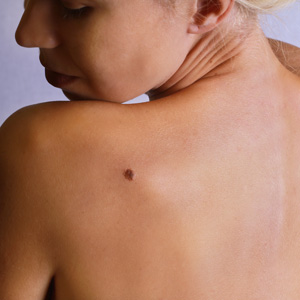Moles are common growths that occur on just about every body. These growths develop when melanocyte cells in the epidermis form in clusters rather than spread out. Most often, melanocyte cells are normal, leading to the growth of a benign mole. The concern with moles is, usually due to sun exposure, melanocyte cells may become abnormal, resulting in a cancerous mole or melanoma.

Due to the link between moles and melanoma, more people feel concerned about the moles they currently have. Even with specific parameters that indicate the abnormal growth of melanocyte cells, one may feel very unsure about how to determine if a mole should be checked by a dermatologist.
It is important to become familiar with the signs of skin cancer, but to become even more familiar with the moles on your own body. We are all different, which means our moles will not look just like anyone else’s. As we age, it is possible to notice moles fading away or becoming larger. We may develop new moles with age, though new moles are the result of sun damage at some point in time. Even persistent exposure during the teenage years can appear on the skin years later in the form of new moles.
Does an itchy mole require treatment?
There are various characteristic in moles that we learn to watch for, such as changes in size or color. A mole that becomes very itchy may be concerning and may cause anxiety. If a mole starts to itch, the first action could be to perform a self-examination of the mole in question, as well as other moles. Some of the things to look for in the self-exam include:
- Color. Does the mole have multiple hues, like tan and red?
- Shape. Is the mole circular in shape, or is it asymmetrical?
- Size. Has the mole grown since it was last checked?
- Borders. Are the lines around the mole jagged?
- Change. Has any other change occurred in the mole, such as bleeding?
Any changes to an existing mole should be checked by your dermatologist. If you have not been regular with skin examinations at home, or have never learned how to perform a self-exam, it is best to have an itchy mole examined by your dermatologist. Even if the chances are great that the itchy mole is benign, it is far better to confirm this with a professional examination than to “wait and see.”
Skin cancer is a condition that, if treated early, has a very good prognosis. Dr. Koreen and his experienced staff provide gentle, compassionate care for suspicious moles and growths, understanding the fear that surrounds the potential for skin cancer. Schedule your skin cancer screening today by calling (631) 417-3300.









